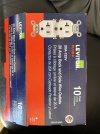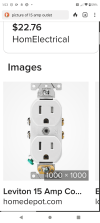This is only a newer outlet that will have the horizontal with the vertical. There is a outlet with only the horizontal on one side that guarantees 20 ampmost likely 15 amp. the 'holes' tell you which type of outlet you have. 2 vertical and round ground is 15. if one hole looks like a sideways "T", its 20 amp.
arc fault breakers are more important than 20 amp outlets. and don't use cheap plug strips


